What does genetic testing involve?
Genetic tests examine a person's genes. This can be done to help estimate their risk of a particular disease or detect any hereditary diseases, for instance. The tests are usually done using a blood sample or a small amount of saliva. Genetic testing is currently only useful for a few conditions. Because the results may have repercussions for children and siblings, genetic tests may only be performed in certain situations. This is typically regulated by law – in Germany the Genetic Diagnosis Act (Gendiagnostikgesetz) covers this sort of testing.

